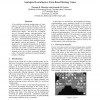47 search results - page 4 / 10 » Multiplayer role games applied to problem based learning |
138
click to vote
NEUROSCIENCE
2001
Springer
15 years 5 months ago
2001
Springer
The Brain is a slow computer yet humans can skillfully play games such as tennis where very fast reactions are required. Of particular interest is the evidence for strategic thinki...
128
click to vote
IJCAI
2007
15 years 2 months ago
2007
A key problem in playing strategy games is learning how to allocate resources effectively. This can be a difficult task for machine learning when the connections between actions a...
109
click to vote
ICCBR
2005
Springer
15 years 6 months ago
2005
Springer
While several researchers have applied case-based reasoning techniques to games, only Ponsen and Spronck (2004) have addressed the challenging problem of learning to win real-time ...
DIGRA
2003
Springer
15 years 6 months ago
2003
Springer
Communication between players in networked computer games is often inadequately implemented. The games do not exploit the full potential of using different forms of communication ...
105
click to vote
DIS
2007
Springer
15 years 7 months ago
2007
Springer
As mentioned in French secondary school official texts, teaching science implies teaching scientific process. This poses the problem of how to teach epistemology, as traditional sc...


